This blog was written by Dasha Agoulnik, a NASM certified personal trainer. She is a Master of Science in Nutrition student at Tufts University’s Friedman School of Nutrition Science and Policy and future registered dietitian. Follow her on Instagram (@dashafitness), Facebook, or email her to learn more! For free workouts, recipes, giveaways, and #FWDScience, subscribe to her newsletters.
• • •
Choosing the right diet can be a difficult and time-consuming task. In my experience, the most effective diets are not about sacrifices or restrictions. A sustainable diet is about finding the ideal balance of macronutrients to give your body what it needs to power through your daily activities. Whether your day-to-day routine requires manual labor or sitting at a desk, it’s possible to create a well-balanced meal plan that leaves you satisfied. That’s why, in my professional experience, I focus on creating flexible diet plans specifically formulated to fit individual needs.
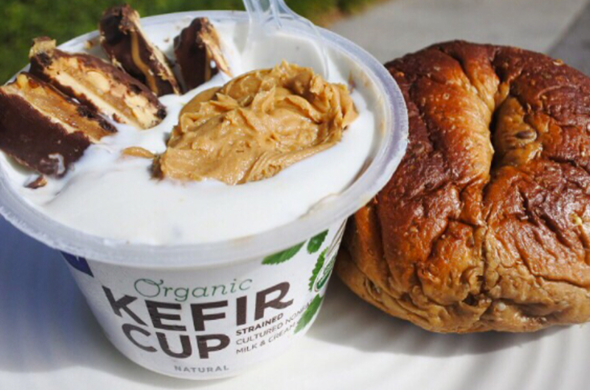
We in the fitness world refer to these flexible meal plans as “If It Fits Your Macros” (IIFYM).
First things first, what’s a macronutrient? Macronutrients are the three essential components of food that provide energy:
- Fats (F)
- Carbohydrates (C)
- Proteins (P)
History of Flexible Dieting:
The IIFYM trend initially took off in the bodybuilding community as competitors grew tired of eating strict and monotonous diets of “clean foods.” Not only were these diets too strict and difficult to maintain, they even led to psychological problems. According to a recent study, “pre-competition, [competitive bodybuilders] reported increased disordered eating and a greater commitment to exercise. Post-competition, the intensity of behaviors decreased to baseline levels.”
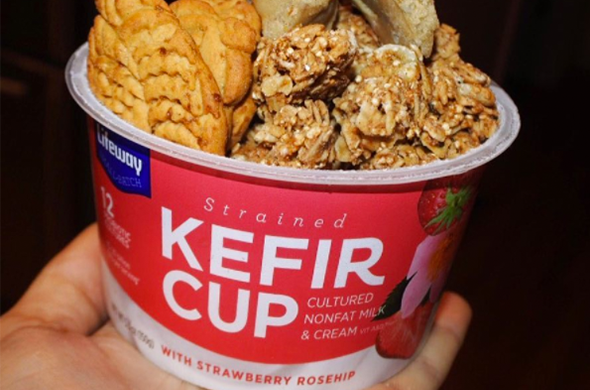
These athletes wanted something that could adapt to their lifestyles, rather than vice-versa. They needed something sustainable — that allowed them to eat a wide variety of delicious foods — while staying within their calorie limits. Now, flexible dieting is arguably the most preferred style of dieting among body builders.
How to adapt IIFYM?
Flexible dieting is more of a lifestyle than a diet. In general, any food is permitted as long as it “fits” your allotted daily macronutrient goal. While that does include pizza and ice cream, you can’t go overboard. The majority of your food should come from micronutrient (vitamins and minerals) dense sources such as whole grains, vegetables, lean proteins and healthy fats. Flexible dieting essentially allows you to eat anything in moderation: eat your lean protein, whole grain and vegetables, but have an ice cream cone, too. It’s about creating a balanced and sustainable lifestyle.
According to Lifeway’s Registered Dietitian Nutritionist (RDN) and Nutrition Marketing Coordinator Emily Kean, “Counting your macros can work for a variety of individuals due to its balance and ‘everything in moderation’ approach. It enables people to meet their goals — whether maintaining weight, putting on lean muscle or losing body fat — without using restrictive standards.”
What Are My Macros?
There are a lot of factors that go into calculating macros, including age, weight, height, activity level and fitness goals. Your macro ratio and quantity will probably be different than almost everyone you meet. While there are online calculators that can configure macronutrient goals for you, they are often inaccurate due to the wide variability and should only serve as a general baseline. It’s always best to talk to your dietitian about your unique macro needs.
What Kind of Snacks Fit into a Macronutrient Diet?
Get comfortable reading nutrition labels, because you’ll be relying on them for every meal and snack to ensure you hit your daily goals.
Let’s use Lifeway’s new Kefir Cups and Farmer Cheese Cups as an example of how to read nutritional labels for flexible dieting. These cups are some of my favorite macro/micro choices. After taking a look at the breakdown, you’ll understand why:
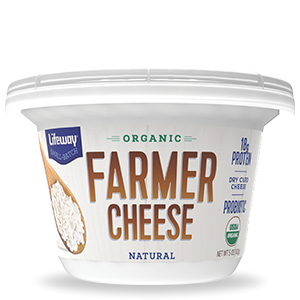
1 Farmer Cheese Cup
Macros
- 1.5 grams of fat
- 4 grams of carbohydrates
- 18 grams of protein
- (1.5F/4C/18P)
Calories: 101.5
Serving size: 1 container (150g)
- 12 probiotic cultures
- High in calcium
- High in vitamin A
- No added sugar
These cups are low in fat and carbohydrates, which leaves a lot of room for toppings and other applications. Depending on what I’m in the mood for, I’ll add toppings like sun-dried tomatoes, cereal, or fresh berries. Lifeway’s Farmer Cheese also works well atop salads or sweet potatoes or even spread onto whole grain crackers.
To compare, a yogurt cup of the same size might have 7F/20C/10P and likely has a lot of added sugars. According to flexible dieting, you could have the whole milk yogurt by itself OR you could have Lifeway’s Farmer Cheese Cup, loaded with micronutrients and probiotics, and still have plenty of room for toppings!
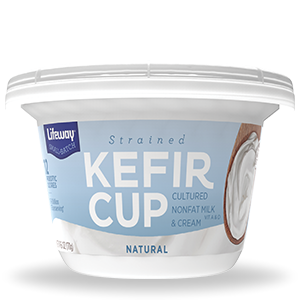
1 Lifeway Plain Kefir Cup
Macros: 1.5F/7C/13P
Calories: 93.5
Serving size: 1 container (150g)
- 12 Live + active cultures
- 15-20 billion CFU per serving
- High in calcium
Similar to the Farmer Cheese Cups, Kefir Cups are low in fat and carbs, which also allows more flexibility in how you choose to reach your daily goals. Flavored Kefir Cups, which only have 2 extra grams of sugar, are also a delicious alternative if you don’t want to add your own toppings or want to do both!
Example Day based on Dasha’s macros:
Breakfast
- Oatmeal with peanut butter
- Veggie omelet with spinach, mushroom, zucchini
- Blueberry lavender farmer cheese cup topped with fresh blueberries
Lunch
- Salad with chicken
Pretraining
- Chocolate rice cakes with cherry chocolate kefir cup
Post-training
- Protein shake
Dinner
- Teriyaki stir-fry with rice, chicken, vegetables, sauce
Before Bed
- Peanut butter and sugar-free jelly sandwich
- Natural farmer cheese cup topped with cereal and sugar free syrup
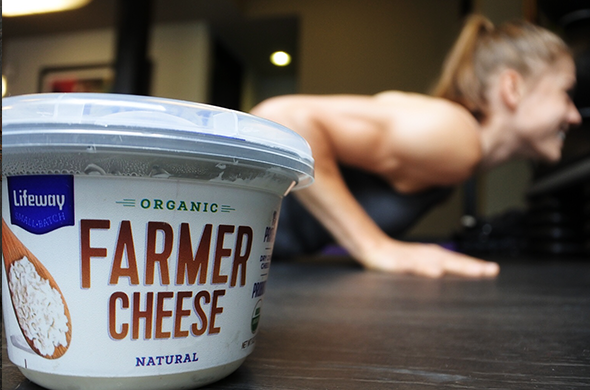
The bottom line is, flexible dieting, IIFYM — whatever you want to call it — is truly just common sense. Instead of restricting yourself and hyper-focusing on a negative (I can’t have…), turn your diet into something more positive (I can have…)! By doing this, you will teach yourself the importance of balance. Sure you can eat that cookie, but you may need some lean protein and vegetables to keep you full and on point to hit your macros for the day.